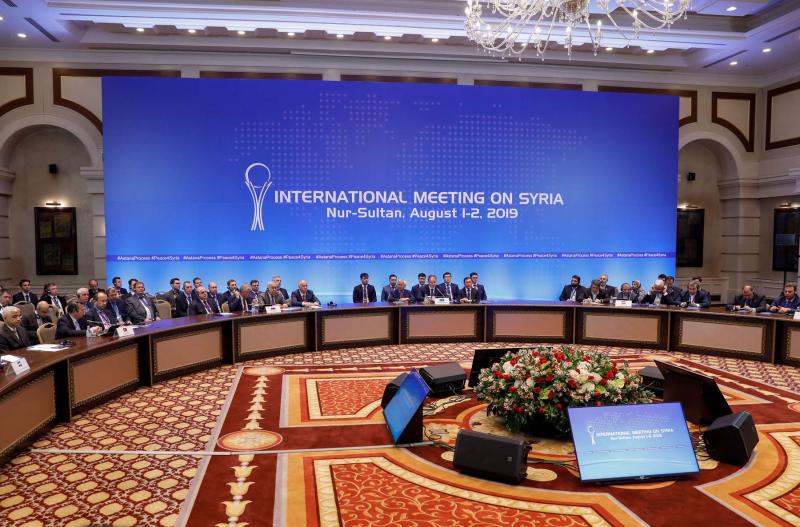Iran, Russia and Turkey, seen as the guarantors of the Astana process that works towards a ceasefire and political settlement of the Syria conflict, have reaffirmed their adherence to sovereignty, independence, unity and the territorial integrity of Syria.
“The results of the 13th high-level meeting within the framework of the Astana process are very satisfying, as this is an important component of multilateral efforts to establish peace in Syria,” Kazakhstan’s Deputy Foreign Minister Roman Vasilenko said, referring to a trilateral statement issued on August 2 in Nur-Sultan, the capital of Kazakhstan.
“Today’s high-level meeting is a manifestation of efforts directed by the guarantor countries,” Vasilenko said, according to Mehr News.
The three countries are considered guarantors to a process that began in January 2017 and includes the Syrian government as well as a Syrian opposition delegation of rebel factions.
Iraq and Lebanon are new observers to the Astana Process.
Russia, Turkey and Iran all agree on making Idlib, located in north-central Syria, a demilitarized zone. The three are also concerned about an increasing presence of the terrorist organization Kheyat Tahrir al-Sham in the region, and stated that they will continue to cooperate in eliminating other groups such as ISIS, Jabhat Nusra and others.
Both Russia and Iran have supported the government of Syria’s President Bashar Al Assad, who has been waging a civil war since the spring of 2011. The country is also the site of a prolonged proxy war between rebel and terrorist groups, which has resulted in the displacement of more than half of the Syrian population within the country or around the globe, as they seek refugee status.
On August 1, the Iranian foreign minister’s Senior Assistant for Special Political Affairs Ali-Asghar Khaji and his accompanying delegation held the first round of negotiations within the framework of the Astana process with the Russian president's Special Envoy for Syria Alexander Lavrentiev and Russian Deputy Foreign Minister Sergei Vershinin, in Nur-Sultan.
In the meeting, the two sides reviewed the political and field developments in Syria, and discussed the agenda of the 13th meeting of Astana process, particularly with regard to the inclusion of Lebanon and Iraq as observer nations. The Iranian delegation also held separate talks with the Iraqi, Lebanese and Syrian sides during the meeting.
Despite the ongoing violence in Syria, countries such as Iran are working to help build the economy.
The head of the Iran- Syria Chamber of Commerce, Masan Nahas, recently said that Iran has agreed to open three factories in Syria by August 12. Two of the factories will produce skimmed milk and medicines for cancer, and the third will be a car manufacturing plant.
The development coincides with the sharp decline in the output of Iranian factories as a result of U.S. sanctions that have made procuring raw material and spare parts impossible. In February, Iran's Vice-President Es'haq Jahangiri spoke about a "major agreement" between Tehran and Damascus to develop Syria's railway network and establish a power plant in Syria.







 Azerbaijan and Armenia started the process of demarcation of their border on Tuesday, with the installation of the first border markers based on ge...
Azerbaijan and Armenia started the process of demarcation of their border on Tuesday, with the installation of the first border markers based on ge...
 Armenian sappers commenced on Monday mine-clearance operations in the territories adjacent to the Saint Mary Church in village of Voskepar (Armenia...
Armenian sappers commenced on Monday mine-clearance operations in the territories adjacent to the Saint Mary Church in village of Voskepar (Armenia...
 Iran has refuted reports of alleged damage to Shimon Peres Negev Nuclear Research Centre located southeast of Dimona, Israel, during the recent air...
Iran has refuted reports of alleged damage to Shimon Peres Negev Nuclear Research Centre located southeast of Dimona, Israel, during the recent air...
 Iran and Pakistan have signed eight cooperation documents in various fields, and agreed to strengthen ties to fight terrorism in the region.
Iran and Pakistan have signed eight cooperation documents in various fields, and agreed to strengthen ties to fight terrorism in the region.



